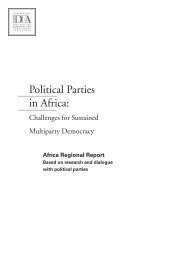Background Document - Danish Institute for Parties and Democracy
Background Document - Danish Institute for Parties and Democracy
Background Document - Danish Institute for Parties and Democracy
Create successful ePaper yourself
Turn your PDF publications into a flip-book with our unique Google optimized e-Paper software.
INTRODUCTION<br />
Defining young women is the first task. Typically, being young falls within the ages of<br />
0 <strong>and</strong> 30. However, when talking about the right to vote, it is generally at the age of 18<br />
that young people attain that right. A third pertinent point may be put <strong>for</strong>ward when<br />
talking about an interest in politics. While it is from 18 years of age that most countries<br />
allow the right to vote, politics can be a subject of interest <strong>for</strong> those who have yet to<br />
reach the legal voting age.<br />
In the current political scene, political parties play a central role in the governance<br />
of modern democracies as they are the bridge between civil society <strong>and</strong> government.<br />
As such, any decline in their voluntary base can be seen as a source of weakening the<br />
weight of civil society in the democratic debate. So the recruit of members is in some<br />
ways a way to promote a healthy democracy.<br />
Additionally, if political parties are bridges between citizens <strong>and</strong> the state, the<br />
more diverse the citizens are within political parties, the more strength the democracy<br />
has. To be diverse, political parties need to reach out to young women. If political<br />
parties are the gatekeepers to women’s advancement to power, <strong>and</strong> as the UN Convention<br />
of the Rights of the Child recognises the right of children <strong>and</strong> young people to be<br />
involved in decision-making (1989), this is a strong case <strong>for</strong> political parties to reach<br />
out <strong>and</strong> promote more young women to be actively involved in politics.<br />
This paper will first review the triple challenge that political parties have to grasp<br />
in order to get more young women into politics; positive <strong>and</strong> negative experiences<br />
will highlight how political parties answer the triple challenge; <strong>and</strong> lastly, recommendations<br />
will be made.<br />
“We know that the guys have their own<br />
networks, even in equal societies, there are<br />
associations that have existed <strong>for</strong> hundreds of years<br />
<strong>and</strong> they still do not let us women in. We need to have<br />
our own networks supporting each other.”<br />
AN OVERALL DECLINE OF ELECTORAL PARTICIPATION<br />
AND PARTY PARTICIPATION<br />
International literature on political participation shows that there is an overall decline<br />
in electoral participation <strong>and</strong> also in the participation in political parties. Overall,<br />
since the mid-1980s, there is a notable decline in voter turnout except in countries<br />
that enjoy some <strong>for</strong>m of compulsory voting. Five of the top seven countries with the<br />
highest voter turnout – Australia, Nauru, Singapore, Belgium, <strong>and</strong> Liechtenstein – en<strong>for</strong>ce<br />
compulsory voting laws.<br />
The voter turnout decline runs parallel with the membership of political parties.<br />
Whiteley sees in the decline the increasingly closer relationship between political parties<br />
<strong>and</strong> the state. This, in turn, has converted active members into ‘unpaid state bureaucrats’<br />
due to increased regulation <strong>and</strong> control.<br />
The increasingly close relationship between political parties <strong>and</strong> the state means<br />
that there is ‘little incentive to recruit or retain members <strong>for</strong> financial reasons’ as po-<br />
WOMEN IN POLITICS DANISH INSTITUTE FOR PARTIES AND DEMOCRACY PAGE 10<br />
ASTRID THORS<br />
MP OF THE PARLIAMENT OF FINLAND AND FORMER MINISTER OF IMMIGRATION AND EUROPEAN AFFAIRS
















